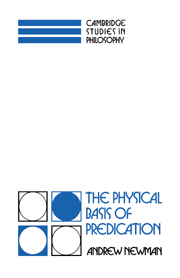
-
Select format
-
- Publisher:
- Cambridge University Press
- Publication date:
- May 2010
- October 1992
- ISBN:
- 9780511663833
- 9780521411318
- 9780521037617
- Dimensions:
- (228 x 152 mm)
- Weight & Pages:
- 0.469kg, 288 Pages
- Dimensions:
- (247 x 174 mm)
- Weight & Pages:
- 0.384kg, 288 Pages
- Subjects:
- Philosophy: General Interest, Logic, Philosophy
- Series:
- Cambridge Studies in Philosophy
You may already have access via personal or institutional login- Subjects:
- Philosophy: General Interest, Logic, Philosophy
- Series:
- Cambridge Studies in Philosophy
Book description
In this book about metaphysics the author defends a realistic view of universals, characterizing the notion of universal by considering language and logic, the idea of possibility, hierarchies of universals, and causation. He argues that neither language nor logic is a reliable guide to the nature of reality and that basic universals are the fundamental type of universal and are central to causation. All assertions and predications about the natural world are ultimately founded on these basic universals. A distinction is drawn between unified particulars (which reveal natural principle of unity) and arbitrary particulars (which lack such a principle); unified particulars are the terms of causal relations and thus the real constituents of the world. The world is not made up of events but of unified particulars and basic universals.
Reviews
"Newman's presentation of his own theory is thorough and solidly argued, and his criticisms of rival doctrines are generally quite persuasive." Review of Metaphysics
"Throughout, the book is very clearly written, and shows an impressive grasp of the relevant literature." Sydney Shoemaker, Cornell University
Contents
Metrics
Full text views
Full text views help Loading metrics...
Loading metrics...
* Views captured on Cambridge Core between #date#. This data will be updated every 24 hours.
Usage data cannot currently be displayed.
Accessibility standard: Unknown
Why this information is here
This section outlines the accessibility features of this content - including support for screen readers, full keyboard navigation and high-contrast display options. This may not be relevant for you.
Accessibility Information
Accessibility compliance for the PDF of this book is currently unknown and may be updated in the future.


